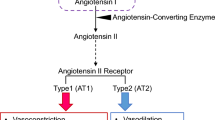Abstract
The renin-angiotensin system (RAS) has been extensively studied in the past decades as an important mediator of hypertension and hypertensive end-organ damage. Originally, the RAS was described as an endocrine system that exerts its action through the effector peptide angiotensin II (ANG II). Recently, tissue-based renin-angiotensin systems which act through paracrine-autocrine mechanisms have been suggested as the more important pathway. After all, genes of the RAS have been cloned transgenic animals overexpressing different components of the RAS were constructed. Furthermore, gene polymorphisms were investigated as genetic markers for hypertension and cardiovascular disease. Finally, very effective substances interacting on different levels of the RAS cascade were developed.
Similar content being viewed by others
Author information
Authors and Affiliations
Rights and permissions
About this article
Cite this article
Rothermund, L., Paul, M. Hypertension and the renin-angiotensin system – evidence from genetic and transgenic studies. Basic Res Cardiol 93 (Suppl 2), s001–s006 (1998). https://doi.org/10.1007/s003950050191
Issue Date:
DOI: https://doi.org/10.1007/s003950050191




